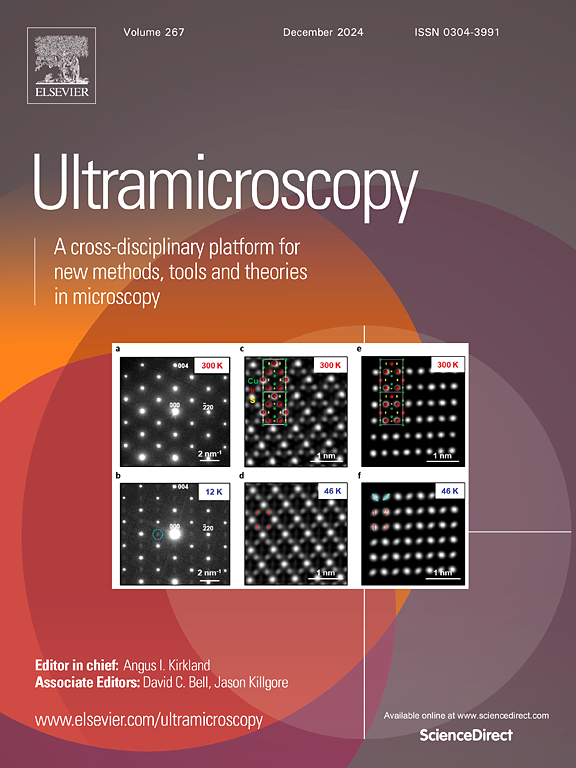原子探针断层扫描质谱中离子解离事件的出现与仪器有关
IF 2
3区 工程技术
Q2 MICROSCOPY
引用次数: 0
摘要
原子探针层析技术(APT)的成功应用有赖于对样品质谱(即 m/z 直方图)的准确解读。有些材料产生的质谱可以直接进行峰值分配/范围划分,但也有许多材料产生的质谱具有无法简单解释的特征。其中一个例子是 Ga2O3,它产生的质谱包含几个宽泛而难以解释的特征。在此,我们研究了 GaO2+ → O1++ Ga1+ 的解离过程,并解释了这一解离过程是如何在质谱中产生宽泛且以前未确定的特征的。我们利用现实的静电模型对解离反应进行了轨迹模拟,并与使用市售的直飞和基于反射电子的局部电极(LE)APT 仪器进行的实验进行了比较。结果表明,这些特征的出现在很大程度上取决于飞行时间(ToF)质量分析仪的具体设计。我们探讨了各种实验参数如何影响解离过程在一维(1D)质谱和二维(2D)相关直方图中的表现。虽然这项工作的重点是与 Ga2O3 有关的特定解离过程,但在这些模拟和实验过程中获得的理解应适用于解释其他材料的解离过程。本文章由计算机程序翻译,如有差异,请以英文原文为准。
On the instrument-dependent appearance of ion dissociation events in atom probe tomography mass spectra
The successful application of atom probe tomography (APT) relies on the accurate interpretation of the mass spectrum (i.e. histogram) from a sample. Some materials yield mass spectra that are amenable to a straightforward peak assignment/ranging, however, there are many materials that produce mass spectra with features that defy simple interpretation. One such example is GaO which yields mass spectra containing several broad and difficult to interpret features. Herein, we study the GaO O Ga dissociation and we explain how this dissociation process gives rise to broad and previously unassigned features in the mass spectrum. Trajectory simulations are performed for the dissociation reaction utilizing realistic electrostatic models and compared to experiments using commercially available straight flight and reflectron based local electrode (LE) APT instruments. It is shown that the appearance of these features is strongly dependent on the specific design of the time-of-flight (ToF) mass analyzer. We explore how various experimental parameters can affect the appearance of the dissociation process in the one-dimensional (1D) mass spectrum and in the two-dimensional (2D) correlation histogram. While the focus of this work is on a particular dissociation process related to GaO, the understanding gained in the course of these simulations and experiments should be applicable to the interpretation of dissociation processes in other materials.
求助全文
通过发布文献求助,成功后即可免费获取论文全文。
去求助
来源期刊

Ultramicroscopy
工程技术-显微镜技术
CiteScore
4.60
自引率
13.60%
发文量
117
审稿时长
5.3 months
期刊介绍:
Ultramicroscopy is an established journal that provides a forum for the publication of original research papers, invited reviews and rapid communications. The scope of Ultramicroscopy is to describe advances in instrumentation, methods and theory related to all modes of microscopical imaging, diffraction and spectroscopy in the life and physical sciences.
 求助内容:
求助内容: 应助结果提醒方式:
应助结果提醒方式:


